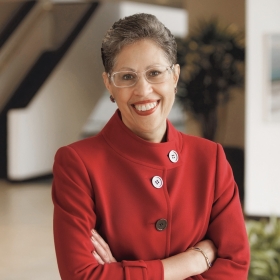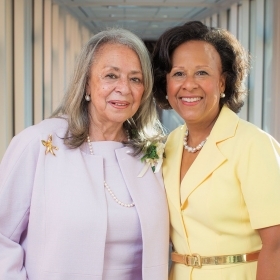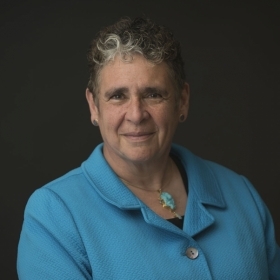Susan Richards Windham-Bannister ’72
In 2008, soon after Susan Richards Windham-Bannister ’72 agreed to lead the newly created $1 billion Massachusetts Life Sciences Center, her mother asked her an understandable question: “This is a big job. … Do you know how to do this?”

In 2008, soon after Susan Richards Windham-Bannister ’72 agreed to lead Governor Deval Patrick’s newly created 10-year, $1 billion Massachusetts Life Sciences Center, her mother asked her an understandable question: “This is a big job. This is the governor. Do you know how to do this?” Susan, drawing on the confidence she first gained at Wellesley and developed during 35 years as a strategy consultant in the life sciences, didn’t miss a beat. “You know, Mom, I don’t know,” she replied. “But I know I can figure it out.”
And figure it out she did, spending seven years at the head of an agency intent on transforming Massachusetts from a life-sciences research hub into an innovation hub where new companies want to start, and established companies want to move. One of the key aspects of her strategy? Promoting gender, racial, and ethnic diversity.
“One of the things that I knew from experience, and from an increasing body of research, is that diverse teams, diverse perspectives, diverse ways of thought, are critical to innovation,” says Susan, who has spent most of her career as the only African-American woman in the room. “I realized that there was a very strong business case for diversity and inclusion in the life sciences, and so if we were trying to make Massachusetts an innovation hub, we had to think about the availability of talent.”
For example, Susan began pouring money into programs such as Girls Who Code and Freedom House that are dedicated to getting girls and kids of color interested in STEM fields. She also started a paid internship program that places undergraduate and graduate students at local startups. “It was really a way of exposing young people to careers in the startup world. We were creating pathways into the industry,” she says. During her tenure, the program funded 3,000 interns, 48 percent of whom were women, and almost 30 percent of whom were students of color.
And while Susan left the Life Sciences Center in 2015, it continues to be a success. In 2017, Governor Charlie Baker granted the center a five year, $500 million extension, a testament to the new jobs, research, products, and ideas it has created.
For Susan, Wellesley is not only a place that cultivated confidence and leadership skills that have helped her succeed in big jobs, it is also where an anthropology class convinced her to change her major from English to sociology, setting her on a path toward the innovation and strategy space. “I got really, really interested in groups and group behavior, and that evolved into an interest in how markets behave,” she recalls.
Following Wellesley, Susan completed a Ph.D. in health policy and management at Brandeis University, and soon she was working as a strategy consultant. “I realized that what I really wanted to do with all of that ability to analyze group behavior was to apply it to the business of health care,” she says. “We look so much at health care as something that operates free from the principles of the market, free from the principles of the ways that groups behave, and that’s just not true at all.”
During several decades working for her own consulting firm, Susan helped bring products ranging from a pneumonia vaccine to extended-wear contact lenses to market. “The point was, how do we make a good case to providers, to physicians, to health plans, to insurance companies, to payers, that there really is a value proposition in bringing this to the market?” she says. When Governor Patrick tapped Susan to lead the Life Sciences Center, it was largely because of her bilingualism in business and policy.
These days, Susan takes on occasional consulting projects. She has also helped other states develop life sciences initiatives, and she is currently the president of the Association for Women in Science. Next, she is eager to crack one of the remaining glass ceilings: company boards.

